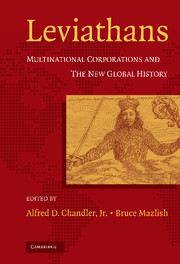Book contents
- Frontmatter
- Contents
- List of Figures and Tables
- Acknowledgments
- List of Contributors
- Introduction
- PART ONE THE SCOPE OF THE MULTINATIONAL PHENOMENON
- 1 A Primer on Multinational Corporations
- 2 Multinational Enterprise to 1930: Discontinuities and Continuities
- 3 Multinationals from the 1930s to the 1980s
- 4 Innovative Multinational Forms: Japan as a Case Study
- PART TWO CULTURAL AND SOCIAL IMPLICATIONS OF MULTINATIONALS
- PART THREE THE GOVERNANCE OF MULTINATIONALS
- Conclusion
- Index
4 - Innovative Multinational Forms: Japan as a Case Study
Published online by Cambridge University Press: 17 August 2009
- Frontmatter
- Contents
- List of Figures and Tables
- Acknowledgments
- List of Contributors
- Introduction
- PART ONE THE SCOPE OF THE MULTINATIONAL PHENOMENON
- 1 A Primer on Multinational Corporations
- 2 Multinational Enterprise to 1930: Discontinuities and Continuities
- 3 Multinationals from the 1930s to the 1980s
- 4 Innovative Multinational Forms: Japan as a Case Study
- PART TWO CULTURAL AND SOCIAL IMPLICATIONS OF MULTINATIONALS
- PART THREE THE GOVERNANCE OF MULTINATIONALS
- Conclusion
- Index
Summary
Multinational enterprises have played a crucial role throughout Japanese economic history since the Meiji Restoration of the late 19th century. Although the evolution of several Japanese multinational enterprises in the last decades of the 20th century parallels the American multinational development experience, in early Japanese multinational organization certain innovative forms and unconventional business strategies deviated from some common Western practices and traditional multinational development theories. The Japanese effectively “changed the rules of the game.” They played a key role in revitalizing Japanese companies and industries and contributed to economic progress of host countries abroad. Japan exhibited the “fastest sustained rate of industrial production, GNP, and per capita income over the last century.” During that century Japan became a prominent and powerful home country for successful multinational corporations.
The innovative multinational enterprises that effectively “broke the mold” rose in response to the unique historical conditions of the environment they faced, including the industrial composition of the domestic economy, the nature of the domestic market, and associated opportunities.
JAPAN'S EARLIEST MULTINATIONALS: SOGO SHOSHA
General trading companies in Japan, known as sogo shosha (defined simply as “a firm that trades all kinds of goods with all nations of the world,”) are a Japanese organizational invention and among the earliest and perhaps most prominent multinational organizations in Japanese business history in scale of physical size and in the range of businesses and commercial activities.
- Type
- Chapter
- Information
- LeviathansMultinational Corporations and the New Global History, pp. 105 - 132Publisher: Cambridge University PressPrint publication year: 2005
- 4
- Cited by



